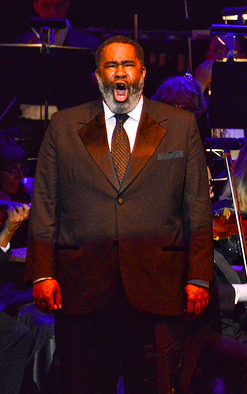

Eric Owens
A singer of real substance
May 13, 2014


Eric Owens, singing at
Opera San Antonio gala concert in 2013.
Photo:
Karen Almond
A year ago Mr. Owens had stood among a raft of important singers in the Opera San Antonio’s inaugural concert. I have been kicking myself for missing that concert, and Mr. Owens’s performance on Monday greatly intensified the violence of those kicks. His excellent collaborator was the pianist Cheryl Cellon Lindquist.
The venue was the San Antonio Museum of Art’s Great Hall, a fairly intimate, resonant space that is flattering to big, well focused voices, though not so friendly to small or flabby ones.
Mr. Owens’s voice, a mountain rimmed by a blazing corona, needed no flattering. His instrument was enormous and tightly focused, brilliant on top and oceanic on the bottom, accurate and steady throughout its range, blessed with great finesse in the control of dynamics and coloration.
Instruments of that calibre are wonderful to hear even if the singer has no idea what he’s singing about. But Mr. Owens is a singer of real substance.
His program comprised two arias by Mozart, two by Verdi, and three songs from Broadway musicals. That’s not a lot of material, but it covered a lot of expressive and musical territory — a short program, but a big one. From Mozart came the concert aria ”Mentre ti lascio,” in which a father is riven by trepidation as he takes leave of his daughter; and Sarastro’s magisterial “In diesen heil’gen Hallen” from “The Magic Flute.” Verdi contributed “Infelice!… e tuo credevi” from “Ernani,” in which the noble Don Ruy expresses his devastation and disillusionment upon finding two men in his wife’s bedroom; and “O tu, Palermo” from “I vespri Siciliani,” in which the Sicilian patriot Giovanni sings of his love for his country.
Most remarkable about these performances was the completeness with which Mr. Owens inhabited the very disparate characters in these pieces, and their disparate sound worlds.
Almost inevitably, when opera arias are ripped from their contexts and strung together in a recital, they can take on a generic, abstract gloss, like the paella, escargots and Wienerschnitzel at a Continental restaurant. That never happened in Mr. Owens’s recital. Each piece he sang was an individual, compelling totality, with the dramatic situation, the character’s emotional state, even the setting and the costume, concentrated in his voice.
Mr. Owens took equal care with the popular portion of his program — “Some Enchanted Evening” from “South Pacific,” by Richard Rodgers and Oscar Hammerstein II; “If Ever I Would Leave You” from “Camelot,” by Alan Jay Lerner and Frederick Loewe; and “Ol’ Man River,” from “Showboat,” by Jerome Kern and Hammerstein.
Mr. Owens’s “Ol’ Man River” was, by a comfortable margin, the most affecting account in my experience. The power of this performance stemmed in part from a courageous interpretive decision. In “Showboat,” “Ol’Man River” is sung several times by Joe, a Southern black stevedore on the Mississippi. The role’s most famous interpreters, in two film versions of the musical, were Paul Robeson and William Warfield, both undeniably great singers. But their diction was as precise and neutral as Edward R. Murrow’s, and they were guarded in their portrayals of Joe’s observations about racial and economic injustice, an important theme of the Edna Ferber novel upon which the musical was based.
The caution in those classic interpretations was an artifact of the period, and a confirmation of Ferber’s critique of racism. Too much honesty would have offended much of the white audience.
Mr. Owens held nothing back — neither Joe’s undercurrent of rage nor his black Southern dialect. “Ol’ Man River” wasn’t just a song. It was transfixing theatre.
Mike
Greenberg